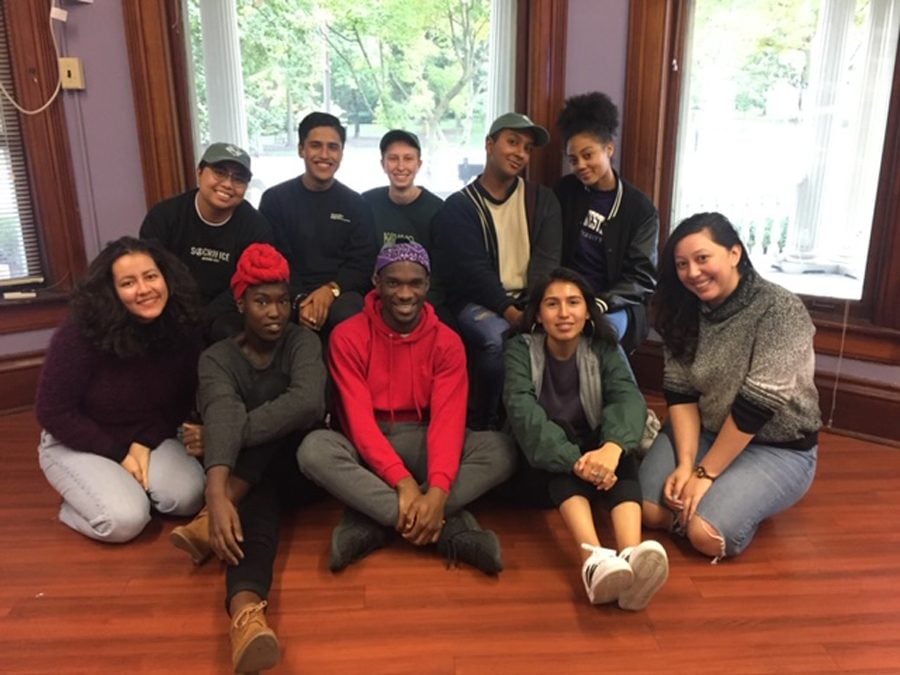Compass peer mentor program gives FGLI students a place to call home
The Compass peer mentor program gives guidance and resources to a selected group of the first-generation and low-income community.
May 30, 2019
Jesi Rojo wasn’t sure if they wanted to attend Northwestern, a university they saw as predominantly rich and white.
Rojo arrived on campus filled with “angst” and “anger,” they said, and wanted to make their way without the help of any organization or community on campus. It wasn’t until one day when the SESP junior was “dragged” by a friend to Sharitza Rivera, the coordinator of the Compass office, when they decided to give the program the chance.
The decision, Rojo said, was the “best thing to happen to me in the last three years.”
Compass is a year-long peer mentorship program run by Student Enrichment Services designed to help first-year, first-generation, low-income students.
When it began in 2015, the program only had 12 mentees who were guided by four mentors. Now, it’s expanded to 36 mentees, split between eight mentors. The mentors are chosen by Rivera, assistant director of SES, and represent either the first-generation or low-income communities — or both. She also considers hiring mentors from different undergraduate schools at NU and who have different identities.
“Particularly with first generation and low income students, it has such a positive impact to hear from someone who’s a peer, who’s already been here, talk about their experience with that lens, Rivera said. ”And how it makes them engage with the university differently and makes them feel like the university’s a place for them.”
Rojo joined Compass during her first-year as a mentee. This year they’re a junior mentor and plan on being a mentor for the next year. As a mentor they do several tasks including planning weekly workshops and organizing biweekly meetings with their mentees, where they discuss topics like academic problems, how to get the most out of financial aid, and relationships. These hour-long meetings between mentor and mentee, Rojo said, can occur while walking down Sheridan, going for a drive, or even by playing video games in Norris’ basement.
Wherever and whatever makes the mentees comfortable is how Rojo makes the best connections, they said. At times, the mentees “don’t even realize how much they’re saying,” Rojo said.
Rivera said Compass’ success is due in part to the community the program has cultivated. Keeping the mentorship small, Rivera said, helps the mentors and mentees build stronger relationships and spaces where they feel safe and where “they’re not going to get microaggressed about their income status,” she said.
Rojo said they have experienced these microaggressions first-hand as a result of what they wear. With a love for fashion, Rojo’s interests appear in their mentor workshops and in public. In one workshop, Rojo had mentees guess who each mentor was based on their introductions, an exercise modeled after America’s Next Top Model. In public, Rojo wears fancier clothes to not seem like an imposter, but at Compass, Rojo wears them because they’re “finally allowed to be me.”
“Northwestern wasn’t built for people like us — us being FGLI students,” Rojo said. “Northwestern didn’t intend to have students that felt or had experiences like myself or like other Compass community members. But I think it’s 100 percent vital for students to have a space where they can feel most authentically themselves. Because there’s so much code-switching that goes on in the classroom, there’s so much pretending you’re not actually poor. There’s so much garbage like that.”
Isaac Lawanson has been a mentor for the past year. He said he has seen his mentees grow immensely over the past year in their academics and in their ability to “self-advocate” their needs to the University.
Students who come from wealth or who have parents who attended colleges are already at an an advantage, he said.
“The system is already set up for them to be successful,” the McCormick junior said. “We are already behind and we have to catch up. Compass has given us a way to catch up.”
Rojo added that although Compass can’t accommodate every FGLI student, the existence of Compass is a testament to others that there is a large enough group of people who can relate to their experiences.
“I was really mistrustful of like the word community and — Compass uses the word community a lot — and I use the word community a lot now,” they said. “But in the most authentic sense of community, which I think of as people who care for you, who see you, who give you the space to speak and be heard. For people who love you, and are willing to be loved by you. hat to me is what a community is. And that, to me, is what Compass is.”
Twitter: @awstinbenavides
Email: austinbenavides2022@u.northwestern.edu
Related Stories:
– Swimming upstream: Low-income students struggle with NU’s culture of wealth


